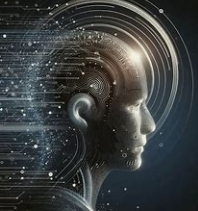Artificial Intelligence (AI) is no longer a concept confined to science fiction; it's an integral part of our daily lives. From voice assistants like Siri and Alexa to personalized recommendations on Netflix and social media, AI is already influencing how we work, interact, and consume information. But what about the future? How will AI continue to shape our lives in the years to come? The possibilities are vast, and the potential for AI to revolutionize industries, improve personal experiences, and even change society itself is enormous.

The future of AI is incredibly exciting and transformative, with the potential to reshape nearly every aspect of our lives. In healthcare, AI can analyze vast amounts of medical data like genetic information, lab results, and clinical notes to provide personalized treatment plans. By predicting potential health risks or recommending the best course of action for an individual, AI could revolutionize how doctors make decisions. AI-powered algorithms can speed up the process of discovering new drugs by predicting which compounds might work best for specific diseases, leading to faster, cheaper, and more targeted therapies. Robotic surgery systems powered by AI are becoming more advanced, allowing for minimally invasive surgeries, while telemedicine and virtual health assistants powered by AI could make healthcare more accessible. In transportation, self-driving cars, trucks, and drones are already on the horizon, and in the coming decades, they could become mainstream. AI will play a key role in making autonomous vehicles safer and more reliable, which would drastically change our daily commute, logistics, and supply chains. AI could optimize traffic flow in cities by analyzing real-time data from traffic cameras, sensors, and GPS devices, reducing congestion and improving travel times. In the workforce, automation of routine jobs, particularly in manufacturing, logistics, and customer service, may displace some workers, but it could also create new jobs in tech, data analysis, and AI maintenance. In industries like law, finance, and marketing, AI can assist with tasks like data analysis, contract review, and personalized customer outreach, improving efficiency and allowing workers to focus on more creative, strategic tasks. AI could serve as a collaborative assistant to employees, helping with project management, decision-making, and idea generation, which would allow people to be more productive. In education, AI can analyze how students learn, identify their strengths and weaknesses, and adapt educational content to fit their individual needs, helping improve learning outcomes, particularly for students who need extra support. AI-powered virtual assistants could help students with their studies, answering questions, explaining concepts, and guiding them through difficult material, democratizing education and making high-quality tutoring available to more people around the world. In entertainment, AI is already being used to recommend music, movies, and TV shows based on our preferences, and this trend will continue to evolve. In the future, AI could even create original content, such as films, video games, or music, tailored to individual tastes. AI will make video games more immersive by creating more realistic characters, environments, and narratives, and could allow for personalized gaming experiences based on a player’s actions and preferences. As AI systems become more integrated into our lives, there will be increased concerns about data privacy and security. Striking the right balance between innovation and privacy protection will be critical. Governments and organizations will need to create frameworks for responsible AI development, regulating its use in areas like surveillance, criminal justice, and finance to ensure these systems are used ethically. AI systems are only as good as the data they are trained on, so ensuring fairness and avoiding bias will be a major challenge. Ensuring AI is fair, unbiased, and transparent will be essential. AI could help in predicting climate patterns, optimizing energy usage, and reducing waste, contributing to sustainability efforts. It could also help in developing carbon capture technologies and improving renewable energy solutions. As AI continues to advance, it will serve as a creative partner for artists, helping generate new ideas, create music, art, literature, and more. AI could also accelerate innovation, helping scientists and engineers solve complex problems faster in fields like material science, quantum computing, and nanotechnology. The future of AI holds immense promise, but also significant challenges. As AI continues to advance, it will make our lives easier, more efficient, and more connected. However, its development must be carefully managed to ensure it benefits society while addressing the potential risks and ethical dilemmas that come with it.

Artificial Intelligence (AI) is rapidly transforming the world, unlocking possibilities that were once the stuff of science fiction. As AI continues to advance, it promises to reshape nearly every aspect of our lives—from how we work to how we interact and learn.
Best regards,
Roneda Osmani













